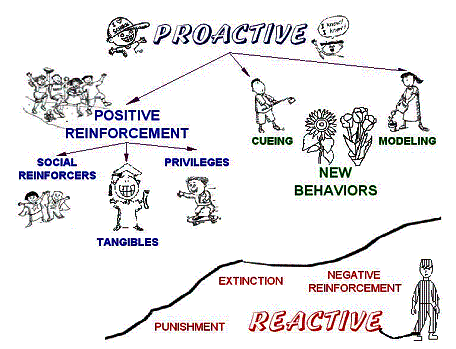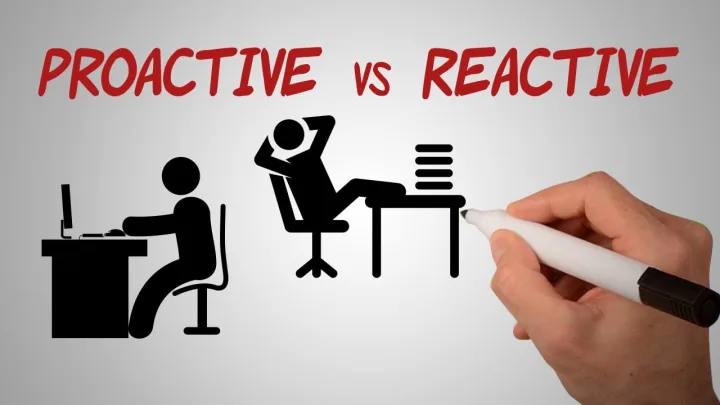Comparative Analysis of Two approaches, Proactive & Reactive
Why I am writing this article? To help you out in decision making in your pursuit of achieving your goals.
The proactive approach means to anticipate the future with the help of using a different set of skills that you are trying to develop and some strategies to compete or overcome with future happenings.
The reactive approach can be described as waiting for things to happen and then respond accordingly.
Proactive vs Reactive Management
Normally proactive management is thinking ahead of change whereas Reactive management is responding after changes have occurred.

Streamlines of Proactive Management
In this style of management, teams are involved in the study of different possible criteria which helps them in building a positive force to overcome future problems or to be a part of the growing world in a better manner. Some merits of proactive management are discussed below:
- The flow of Information is increased for a better understanding of future happenings.
- Helps team members in assessing changes ahead, can provide better services to customers which helps in the growth of the goodwill of the company.
- Level of satisfaction increases.
- Keeps you ahead of competitors.
- Performance appraisals become more target oriented. For instance, employees who are better in anticipating future needs of customers should be promoted 100 times more than people who are sitting on their couches still waiting to respond to the crisis situation.
Streamlines of Reactive Management
Reactive management depicts that there is a lack of planning, rather people are so confident about their policies that nothing will go against their plans. So with the help of this approach, the thought process of your business will not be able to boost up in case of unexpected concerns in day-to-day routine work or change in public trends. Some demerits of reactive management are discussed below:
- Lack of new creative ideas.
- The flow of information is very limited.
- Decision making is normally done without proper research work.
- When you are not achieving something extraordinary, job satisfaction levels will always be lower resulting in a decrease in productivity.
- Research & Development is not the main priority of reactive management which sometimes result in complete failure of analyzing the opportunities or threats available to your products or services in the market, thus resulting in the downfall of your business.
The guideline in Hiring New People
Employers can take guidance by having detailed know-how of the differences between proactive & reactive management. It is suggested that while hiring young talent, present them with case studies to check whether they are proactive or reactive. Identification of proactive or reactive personality can play a vital role in determining the effectiveness of one’s hiring decision. It doesn’t mean that people following the reactive approach cannot be hired but they can also be groomed to avail the desired results within a specified time if they are interested in developing themselves. No one is born smart. Employees who are keen to do hard work and are eager to learn new things must be given preference.
Increase in the significance of Feedback
In a proactive management style, senior managers always welcome negative feedback as well. In case of negative feedback, senior managers try to investigate the problem in depth, which helps him or her not only in solving the current problem but also enables them in developing different case studies to identify the other possible problems that can also be faced in future. Consequently, a proactive manager is more capable of developing a healthy environment of the company as compared to a reactive manager.
For example, the quality control manager of a furniture company had a complaint in quality of wood. The reactive manager will finish the concerns of complaining customer only and won’t bother to check anything else. The proactive manager will solve the current problem and will go to the core of the problem. Thus, making all the employees be more perfect in their day-to-day work for better wealth management and other prospects.
Characteristics of Proactive & Reactive People

Learning Nature
Reactive people always think they have enough knowledge and hesitate to learn new things until they are in dire need of it.
Proactive people are open to new ideas and are in the pursuit of polishing their skills to achieve their goals.
Career Development
Reactive people prefer doing routine jobs which results in them living in the same socio-economic level all their life.

Proactive people are always trying to challenge themselves to learn more things resulting in the growth of careers.
Blame Game
Reactive people often blame others for their failure.
Proactive people mostly believe in self-accountability to polish there hidden talent.
Driving Force
Reactive people are mostly derived from emotions.
Proactive people’s behavior is a product of their conscious behaviors.
Uncontrollable Factors
Reactive people try to spend emotional energy more on things which they cannot control. For example, if the Football team one is supporting is losing the match, reactive people tend to be more upset about it.
Proactive people don’t focus on things which are not in their control. For example, if the team they are supporting is losing the football match they know that nothing is in their hands so why get worried sick about it?
Secret Success Factors of Being Proactive
- If you are proactive you can cherish better health as you will be more careful about it. Eating healthy & exercising will become your daily rituals.
- Relationships can be much better if you are proactive. For example, if you are giving gifts to your loved ones without asking them, it will have a completely different impact on them compared to if it were not the case.
- Professional growth will be more rapid if you are fulfilling the needs of your boss preemptively. It will speed up the process of making you more productive in your job.
- Entrepreneurship is one of the great blessings which cannot be achieved without being proactive.
- The proactive approach is a reliable source for achieving self-confidence.
Summing up our above discussion in one line is:
‘’Stop Being reactive, start Being proactive’’







Share Your Thoughts